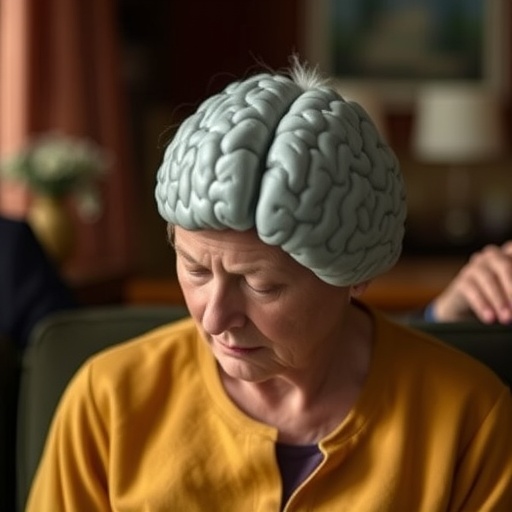In an age where the interplay between social dynamics and cognitive health is increasingly scrutinized, a groundbreaking longitudinal study spanning 24 countries has unveiled some stark realities. Conducted by researchers Zhang, W., Zhang, J., and Gao, N., the study brings to light the insidious effects of social isolation on cognitive decline in older adults. As societies grapple with the implications of an aging population, the findings of this research are not merely academic; they resonate deeply within the fabric of public health and personal wellbeing.
At the core of this investigative endeavor is the alarming correlation noted between social isolation and the deterioration of cognitive abilities among the elderly. As individuals age, their social networks often thin out, sometimes due to mobility issues, health complications, or the loss of close friends and family members. This study has meticulously tracked these changes over time, demonstrating that those who frequently experience a deficit in social interactions are at a significantly higher risk of cognitive decline. This evidence serves as a clarion call for both health professionals and policymakers to prioritize social connectivity as an integral component of cognitive health strategies for seniors.
The longitudinal aspect of the study is particularly noteworthy, as it underscores the evolving nature of social connections and cognitive health throughout multiple stages of aging. Unlike cross-sectional studies that provide a snapshot in time, the longitudinal methodology employed allows for a deeper understanding of how persistent isolation influences cognition over years. It underscores that the effects of isolation are not merely momentary or situational but can have long-term ramifications on mental faculties, including memory, attention, and decision-making skills.
Furthermore, the researchers meticulously collected data from diverse populations across different nations, thus ensuring that the findings are both robust and generalizable. This cross-cultural dimension enhances the study’s credibility, as it accounts for variables particularly relevant to various cultural and societal contexts. The participants included men and women from various backgrounds, ensuring that the patterns observed in cognitive decline could be contextually significant, regardless of geographical or sociocultural differences.
Cognitive decline is a multifaceted phenomenon influenced by a myriad of factors, including genetics, lifestyle, education, and environmental influences. However, this research explicitly positions social isolation as a formidable variable that can unleash a cascade of cognitive deterioration. It highlights the importance of maintaining robust social ties and fostering community engagement to combat this decline. Communities across the globe must now consider proactive measures that encourage social interactions among older adults, thereby potentially enhancing their cognitive resilience.
In analyzing the causal mechanisms behind the correlation, the study offers several compelling hypotheses. Social interactions have been shown to engage various cognitive processes, facilitating continuous mental stimulation. When older adults are isolated, they lack opportunities for meaningful interaction that can challenge their minds, thereby accelerating cognitive decline. Moreover, social relationships often provide emotional support, which can buffer against stress and depression—two additional factors that adversely affect cognitive health.
The implications of these findings extend beyond individual health, prompting serious considerations for public policy and community planning. Investments in programs designed to mitigate social isolation, such as community centers and social clubs tailored for the elderly, can yield not just social but substantial economic benefits by reducing the costs associated with cognitive disorders. Policymakers must take heed and initiate actions that promote environments conducive to social interactions, integrating these strategies into broader health care policies.
This study also inadvertently opens up discussions on the role of technology in bridging the gap created by social isolation. In an era where digital connectivity has supplanted many traditional forms of communication, the rise of virtual social platforms presents both opportunities and challenges. While technology can facilitate connections for some, there remains a significant digital divide, particularly among older populations who may lack the requisite skills or access to these technologies. This duality must be addressed in future studies and policy considerations.
Furthermore, the nuances of the findings prompt discussions about the role of caregivers and family members in supporting the social lives of older adults. The study raises awareness about responsibility not just in nurturing cognitive health but also in fostering social connections. Encouraging family members to engage more with their elderly relatives, promoting intergenerational activities, and uplifting community cohesion can create rich environments where older adults can thrive cognitively and socially.
The results of this longitudinal study carry significant implications for mental health professionals, urging them to adopt a holistic treatment approach that incorporates social well-being into cognitive health intervention strategies. Therapists and counselors can begin to incorporate social skills training and community-building efforts into their treatment plans.
As the demographic transition toward an older age structure continues globally, the study’s findings act as a precursor to understanding the impending challenges. Current and future generations must proactively address social isolation as a public health priority. This research serves to awaken societal consciousness about the critical importance of social connectivity and its implications for cognitive health.
In conclusion, as researchers and healthcare professionals digest these findings and their ramifications, the pressing challenge remains: How can society evolve to support the elderly in overcoming social isolation? This study lays the groundwork, paving the way for future investigations that may further illuminate the profound relationship between social connections and cognitive wellbeing in older adults.
Subject of Research: The relationship between social isolation and cognitive decline in older adults.
Article Title: Social isolation and cognitive decline in older adults: a longitudinal study across 24 countries.
Article References:
Zhang, W., Zhang, J. & Gao, N. Social isolation and cognitive decline in older adults: a longitudinal study across 24 countries.
BMC Geriatr 25, 775 (2025). https://doi.org/10.1186/s12877-025-06430-6
Image Credits: AI Generated
DOI: 10.1186/s12877-025-06430-6
Keywords: social isolation, cognitive decline, elderly health, community engagement, public health policy.




